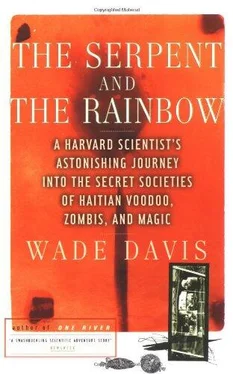Wade Davis - The Serpent and the Rainbow
Здесь есть возможность читать онлайн «Wade Davis - The Serpent and the Rainbow» весь текст электронной книги совершенно бесплатно (целиком полную версию без сокращений). В некоторых случаях можно слушать аудио, скачать через торрент в формате fb2 и присутствует краткое содержание. Год выпуска: 1985, Издательство: Simon & Schuster, Жанр: Старинная литература, на английском языке. Описание произведения, (предисловие) а так же отзывы посетителей доступны на портале библиотеки ЛибКат.
- Название:The Serpent and the Rainbow
- Автор:
- Издательство:Simon & Schuster
- Жанр:
- Год:1985
- ISBN:нет данных
- Рейтинг книги:5 / 5. Голосов: 1
-
Избранное:Добавить в избранное
- Отзывы:
-
Ваша оценка:
- 100
- 1
- 2
- 3
- 4
- 5
The Serpent and the Rainbow: краткое содержание, описание и аннотация
Предлагаем к чтению аннотацию, описание, краткое содержание или предисловие (зависит от того, что написал сам автор книги «The Serpent and the Rainbow»). Если вы не нашли необходимую информацию о книге — напишите в комментариях, мы постараемся отыскать её.
The Serpent and the Rainbow — читать онлайн бесплатно полную книгу (весь текст) целиком
Ниже представлен текст книги, разбитый по страницам. Система сохранения места последней прочитанной страницы, позволяет с удобством читать онлайн бесплатно книгу «The Serpent and the Rainbow», без необходимости каждый раз заново искать на чём Вы остановились. Поставьте закладку, и сможете в любой момент перейти на страницу, на которой закончили чтение.
Интервал:
Закладка:
Andrés was exhausted, and it took a few minutes and several drinks of rum before he could pull himself together. Outside the bagi, the rhythm of the drums had changed and the hollow sound of the conch shell signaled the beginning of the séance.
“So,” the president said finally, “now we can get to work. Did Hector Victor speak properly? Good. He can be very rude. Do you have any matches? Stand up, both of you.” Andrés blew out the candle, and the tip of the wick smoldered like a jewel in the darkness before it died.
“This is a moment that is still to come. A hard time when you’ll get very dirty. The clothes you arrive in will be worth nothing when you leave. It is rough, perhaps too rough.” He paused, and I could hear his breathing as he moved away from the altar. “Light the flame!” A match flared and moved toward the candle.
“The candles are stars. Everything falls into flux and day becomes night, the end becomes the beginning. This is the new life. Move away from the light.”
Rachel and I stepped cautiously into the shadows behind the curtain. Andrés took each of us, first Rachel, then me, and taught us how to shake hands, and how to greet the members of the Bizango. Once satisfied, he led us out of the bagi back to the tonnelle. By then the gate of the compound was sealed and guarded, and the Shanpwel had changed skins and fallen into a single rank that ran along the periphery of the enclosure. Andrés called them to attention, then began to speak. Almost every phrase earned him immediate and violent applause. He explained that he had met us at the celebration of Empress Adèle, and that it had infuriated him to have seen us treated so poorly. How many fools could there be, he asked, who did not know that the whites could be important, that they could help when the proper time came?
“The whites need us, and we need them.” Those were his final words, and with them he instructed Rachel and me to shake hands with each member. Slowly, obeying his order, we moved around the ring offering the ritual greeting we had just learned. Some of the members smiled, some giggled, some displayed faces as hard as wood.
The drums began, then stopped, and one of the queens, her voice like a peacock, began the sad plaintive hymn of the adoration. Other women opened the wooden doors of a small earthen chamber and brought out the sacred coffin, the madoulè , the mother of the society. The procession formed, and Andrés added us to its tail, and together with the other members of the Shanpwel we moved in an ever narrowing circle, so slowly that my ankles began to tremble. When the coffin finally came to rest, each member stepped before it, made his or her offering, and saluted. A series of genuflections followed, and there were other lessons. And then, once the coffin had been lifted and marched back to its chamber, Andrés again led us away from the tonnelle to the bagi.
“It is only a beginning,” he told us, “like a shadow of what there is to know.” We would return, he insisted, both to host a feast and to discover other mysteries. After that it would be our duty to come to each séance. Even if I, in particular, was displaced beyond the great water, I would have to send my genie as an emissary—also, of course, the occasional financial offering to hold up those who might be in need. This said, Andrés leaned forward and whispered two passwords that we would have to know. Then, reaching behind him, he brought out four glasses.
“Drink,” he said, handing one to each of us. The green potion seared my throat.
“And this.” The second dose was viscid and syrupy. “Now you will know how things are to be,” he explained. “The first it was bitter. And the second?”
“Sweet,” I replied.
“Yes. Well, this is the Shanpwel. One side is bitter, the other is sweet. When you’re on the bitter side, you won’t know your own mothers.” The president, his silhouette showing through the voile curtain, threw the dregs of each glass onto the ground, and the drops ran together like mercury to sink into the dusty surface of the earth floor.
After that, Rachel and I entered a long, silent passage and for the next month were as strangers to the sunlight.
Epilogue
“SO IS THIS your choice?” Herard asked. We had met on a roadbed beneath a searing sun. I was ill at the time, my body frail and my throat too dry for talk, and the fevers pushed me into the shade of the scrubland. Herard followed.
“You didn’t listen to me,” he said. “You cannot do these things casually. Everything carries its price. There are things to know and things best left unknown.”
“But we have been received well,” I told him.
“Yes, a child’s game. What do you know?”
“I know that the answers I seek will be found among the Bizango.”
“You know nothing.” He looked away. “And when you fall, will the society of this man be strong enough to lift you up?” The words startled me, for they were the very same as those used by Jean-Jacques Leophin; you could join but one Bizango society, he had cautioned, and it had best be one that could support you in time of need.
“You have been lucky,” Herard continued. “Do not wait for a time when you’ll see things that you should not see.”
“Do you mean the sacrifices?”
“That is the time. Near the end of each year they must gather their powers.”
Herard turned and began to make his way slowly back to the road. As he reached the jeep he called back to me, “You may choose to join the Bizango, or you may come with me and serve the loa. You cannot do both.”
Here were two diverging paths that represented less a choice than a signal that my work had come to a temporary end. To the last Herard would condemn the Bizango, and what he had told me contained a deep warning, a powerful declaration that my actions bore consequences. To complete the initiation into the Bizango society of Andrés Celestin would be an irrevocable step. No longer would I be an outsider, free to alight wherever I chose. I would become part of a matrix, bound to the other members by vows and obligations.
I had arrived in Haiti to investigate zombis. A poison had been found and identified, and a substance had been indicated that was chemically capable of maintaining a person so poisoned in a zombi state. Yet as a Western scientist seeking a folk preparation I had found myself swept into a complex worldview utterly different from my own and one that left me demonstrating less the chemical basis of a popular belief than the psychological and cultural foundations of a chemical event. Perhaps more significantly, the research had suggested that there was a logical purpose to zombification that was consistent with the heritage of the people.
To be sure, I had failed to document a zombi as it was taken from the cemetery, but this was no longer something I deliberately sought out. In the last weeks I had, in fact, been offered two promising opportunities to do so, provided, of course, that the cash payment to the bokor be sufficient. I had gone as far as making the preliminary contacts before I realized that the whole concept had changed. A year or two before I would have gone ahead, emboldened by the deep skepticism I had brought with me to Haiti; now that I had completely overcome my doubts, I found myself forced by that very certainty to turn aside an opportunity that might have offered final proof to those who still shared my early skepticism. The money that the party in question demanded was considerable. If the affair turned out to be fraudulent, I would have wasted the money. If, on the other hand, it turned out to be legitimate, I would have no way of being certain that the money had not been responsible for the victim’s fate. It was an ethical Rubicon I was not willing to cross.
Читать дальшеИнтервал:
Закладка:
Похожие книги на «The Serpent and the Rainbow»
Представляем Вашему вниманию похожие книги на «The Serpent and the Rainbow» списком для выбора. Мы отобрали схожую по названию и смыслу литературу в надежде предоставить читателям больше вариантов отыскать новые, интересные, ещё непрочитанные произведения.
Обсуждение, отзывы о книге «The Serpent and the Rainbow» и просто собственные мнения читателей. Оставьте ваши комментарии, напишите, что Вы думаете о произведении, его смысле или главных героях. Укажите что конкретно понравилось, а что нет, и почему Вы так считаете.












